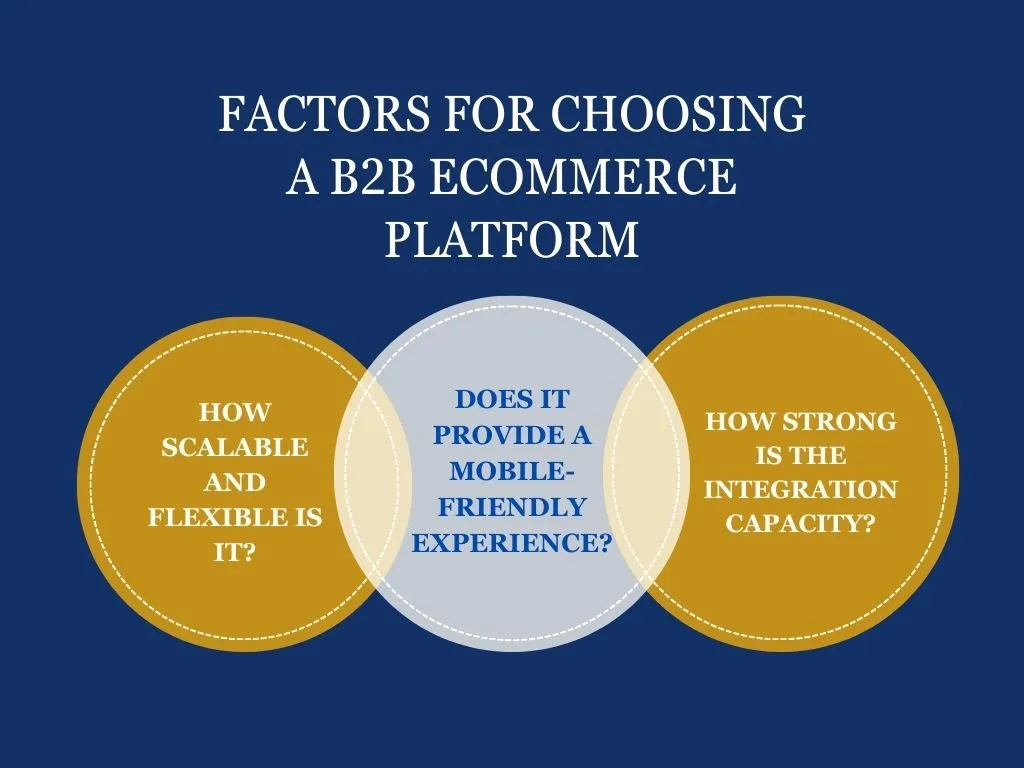Did you know that B2B eCommerce sales are expected to reach $3 trillion by 2027? With such staggering numbers, businesses must harness the power of cutting-edge platforms to stay ahead in this competitive landscape.
When thinking along the lines of eCommerce, the significance of Business-to-Business (B2B) eCommerce platforms cannot be overstated. These powerful tools have become indispensable for accelerating transactions and fostering business growth in the online marketplace.
B2B eCommerce platforms have revolutionized how organizations engage in commerce by providing a virtual marketplace where businesses can seamlessly interact, collaborate, and conduct their operations.
With a wide array of characteristics and features, B2B eCommerce platforms empower enterprises to effectively manage their sales, supply chain, and procurement activities.
This blog post will delve deeper into business-to-business eCommerce platforms, exploring the best platforms and factors to consider while selecting the platform.
What are B2B eCommerce Platforms?
Online marketplaces or platforms enabling business-to-business eCommerce transactions are called B2B platforms. They provide an online environment for businesses to connect, work, and collaborate with other organizations.
B2B eCommerce platforms give businesses the power to conduct inventory administration, buying and sales, and supply chain management online. These also provide services and tools that simplify and automate business transactions, increasing productivity, convenience, and reach for B2B companies in the marketplace.
ValueCoders is your go-to partner for eCommerce product development services.
Top B2B eCommerce Platform Comparison
Let’s explore some significant platforms playing crucial roles in the B2B eCommerce arena. We will discuss their features, prices, advantages, and other factors in the post.
Some of the top eCommerce platforms we will be comparing include:
- Magento
- Shopify
- Bigcommerce
- SAP Commerce Cloud
- Oracle Commerce
Magento or Adobe Commerce
Magento is known for its scalability and flexible options. It can be used for various functions and to integrate multiple business systems. Its main functionality is easy customizations for your catalogs, a better and more personalized customer experience, and advanced pricing options.
Magento is the open-source version of Adobe’s commerce application. However, it also has a more advanced and upgraded version of Magento, which provides the same scalability and flexibility as Magento but with excellent core code support from Adobe.
It is an effective platform with a wide range of eCommerce characteristics, making it flawless for businesses that want customizability and avoid constant authorization and revenue-linked fees.
Key Features
Magento comes with an excellent range of features, including:
- Drag-and-drop website building
- Automated checkout and payment
- Inventory management
- Easy integration and ready-to-use with integrated shipping APIs.
Magento’s broad range of changeable design components and templates enable businesses to build beautiful eCommerce websites. Additionally, the advanced version offers:
- Supports currencies that work in more than 200 countries. Provides services like tax calculation for any of the transactions in the European Union.
- Can handle and manage multiple stores with multiple admin panels.
- Build customized pages for reusable and dynamic blocks.
- Offers integration capabilities with Adobe products like Adobe business intelligence, adobe experience manager, and Adobe Sensei.
Adobe Commerce was developed for eCommerce businesses requiring strong B2B abilities, scalability, and certainty. It is essential to note that even though you’ll get Adobe’s support, you may need a skilled Adobe Commerce provider company or developer to implement unique code.
Pricing
This platform offers three types of pricing strategies:
- First, the community edition, which is free.
- Second, the enterprise edition, which is paid version.
- Finally, the advanced version, Adobe Commerce, with customizable pricing options.
The price for the enterprise edition starts from $22,000, which may vary depending on other needs such as hosting, developing, and extension requirements. However, you need to contact the Adobe Commerce sales team to get an estimate for the advanced version.
Magento is a free platform requiring a skilled developer to add custom modules, integrations, run updates, and maintain the site overall. Therefore, it may not be the best option if you don’t have an in-house development team or budget constraints for hiring an agency.
Also Read: Top Magento Companies To Choose For Your ECommerce Project
Shopify
Shopify is a versatile and user-friendly eCommerce platform that allows businesses to build, customize, and manage online stores effortlessly. It offers various features, including secure payment gateways, responsive themes, and seamless integration with multiple apps and plugins, making it an ideal option for businesses of all sizes.
Key Features
- Excellent user interface making the movement between different modules easy and faster.
- Help get a detailed report on the various functions such as cash flow, sales, inventory, finance, etc.
- Allow business owners to conduct operations smoothly with unified analytics and other staff and inventory management functions.
Overall, Shopify Plus, an enterprise-level platform for eCommerce, is a good B2B platform for sellers who do not require much freedom and want to build their websites quickly. However, this may not be the best option for businesses that need more space for product variations, connections, language diversity, and multi-store functionality.
Pricing
Shopify Plus doesn’t offer a fixed price. The cost of Shopify Plus varies depending on factors such as business scale, yearly revenue, and specific needs.
To obtain accurate and up-to-date pricing details tailored to your company’s requirements, it is recommended to contact Shopify directly or submit a price request through their official website. Shopify’s sales team can provide specific pricing options and discuss any additional costs or services necessary for your organization.
Take a look at this blog as well: Top Shopify Development Companies Proving ECommerce
Bigcommerce
Bigcommerce is a popular eCommerce platform that helps businesses of all sizes bring their products and services online.
Due to its powerful features and extensive capabilities, Bigcommerce provides merchants and customers with a smooth and user-friendly experience. This software offers various customization possibilities, enabling companies to design beautiful, unique web stores representing their brand.
Bigcommerce also provides businesses with a safe and flexible infrastructure to handle massive traffic and transaction volumes without suffering degraded performance. Bigcommerce enables businesses to access a wider audience and increase sales thanks to integrated marketing tools, SEO optimization skills, and multi-channel selling choices.
Key Features
Selling over multiple channels
Big Commerce makes it possible to sell across multiple channels like Amazon, eBay, Facebook, and even traditional point-of-sale (POS) systems. This function aids companies in expanding their customer base and raising sales possibilities.
Integrated promotional tools
Bigcommerce integrates marketing tools to assist companies in effectively marketing their items. It provides email marketing integration, extensive analytics, SEO optimization tools, and other marketing capabilities that help companies attract and keep clients.
Regulation and safety
Bigcommerce takes regulations seriously and offers robust security measures to protect sensitive client data and guarantee secure transactions. With features like SSL certificates, fraud protection, and secure payment gateways, the platform complies with Level 1 PCI DSS.
Software for programmers
Bigcommerce provides a supportive environment for developers, including a large selection of APIs, SDKs, and developer tools. This enables businesses to modify their online shops to meet their needs, integrate third-party services, and create unique functionality.
Valid multi-tenant SaaS architecture is ideal for businesses starting (and iterating) rapidly. It allows your company to evolve quickly with new product lines and plans for market entry without necessitating the control of your IT stack.
Instead of spending money on infrastructure and managing multiple support freelancers, your company may focus on its core capabilities.
Pricing
Bigcommerce offers three pricing models for Standard, Plus, Pro, and enterprise plans:
- Standard: $29/mo
- Plus: $79/mo
- Pro: $299/mo
- Enterprise: Offers estimates based on needs.
You can opt for the best plan based on your needs and budget.
Count on ValueCoders as your reliable partner for all your eCommerce product development requirements..
SAP Commerce Cloud
Leading software corporation SAP created SAP Commerce Cloud, an enterprise-level eCommerce platform formerly known as SAP Hybris Commerce. It was designed to assist businesses in creating and managing digital commerce experiences across many channels, including web, mobile, social, and in-store.
Key Features
Client relationship management
The platform enables companies to provide customers with personalized and relevant material, recommendations and offers based on their preferences and behavior.
Mobile-friendly experience
With the increasing use of smartphones and other digital gadgets, it is essential to have a mobile-friendly online store. Big Commerce offers mobile-friendly and flexible themes, enabling businesses to provide a smooth shopping experience on all devices.
Connectivity and extensibility
SAP Commerce Cloud may be linked with other SAP solutions and third-party systems to take advantage of the current infrastructure and improve functionality. Additionally, it provides opportunities for flexibility to alter and increase the platform’s features.
B2B and B2C scenarios
The platform additionally offers self-service portals, customized pricing, and catalogs for both B2B and B2C situations.
Also Read – How Did We Create An eCommerce Web Solution In Just 3 Days?
Pricing
SAP Commerce Cloud, also known as SAP Hybris Commerce, costs vary depending on various factors, including the organization’s specific needs, the scale of the project, and any additional services or modules chosen.
SAP’s Commerce Cloud typically has an annual subscription cost that is decided by criteria such as transaction volume, user count, and the requirement for additional capabilities. Since every business has unique needs, the cost is typically modified as per their needs.
We recommend contacting SAP directly through their customer care team to obtain the most accurate and updated price information about SAP Commerce Cloud.
Factors to Consider While Choosing a B2B eCommerce Platform
Selecting the right eCommerce platform is essential to take the business online and boost digital commerce. Multiple factors must be carefully assessed to make the most appropriate decision. Here are some important selection considerations:
How scalable and flexible is it?
Consider the platform’s ability to scale and handle increased transaction volumes and expanding product catalogs. Ascertain that the platform can meet your company’s future growth plans and developing needs. Look for customization possibilities and integrations with other systems that are flexible.
Does it provide a mobile-Friendly Experience?
As mobile usage grows, selecting a platform that provides a responsive and mobile-optimized experience is critical. B2B buyers widely use mobile devices. Therefore, ensure that the platform supports mobile browsing, easy navigation, and mobile-specific capabilities.
A mobile-friendly platform gives you a competitive edge in the fiercely contested B2B industry. By providing a user-friendly and responsive mobile experience, you can set yourself apart from competitors and draw in clients who value flexibility and speed in their purchasing processes.
How strong is the integration capacity?
Connecting the platform with your current systems, such as ERP (Enterprise Resource Planning), CRM (Customer Relationship Management), inventory control, payment gateways, shipping companies, and other third-party apps is essential. Your operations can be made simpler and improved with seamless integration.
The ability to integrate allows for real-time data synchronizing between various systems. As a result, it is inevitable that crucial data, like product catalogs, prices, inventory levels, and customer information, is correct and current across all integrated platforms.
Inconsistencies, inaccuracies, and an inconsistent overview of corporate data are all removed by real-time data synchronizing, allowing for better decision-making and enhanced customer experiences.
Security matters the most.
Any eCommerce platform must prioritize security, which is particularly relevant for B2B platforms that handle critical customer and business data. Ensure the platform has strong security safeguards, such as encryption, secure data transmission, frequent security updates, and compliance with industry norms like PCI DSS (Payment Card Industry Data Security Standard).
Implementing SSL certificates is crucial in creating a safe online environment and should be a top priority for B2B eCommerce companies. To encrypt data transmissions and develop safer integration of web browsers and users’ browsers, SSL (Secure Sockets Layer) certificates are essential.
By obtaining an SSL certificate, a B2B eCommerce platform can enable secure communication by encrypting sensitive information such as customer credentials, credit card information, and other confidential data. This encryption process ensures that the data transmitted by the user remains secure and protected from unauthorized access.
SSL certificates offer several advantages to organizations and their clients. Users will get a sense of trust and assurance that their data is always delivered safely. Trust is essential in B2B transactions involving private company information and substantial money exchanges.
Several SSL certificates are available in the market of many brands, like RapidSSL certificate, and Sectigo multi-domain SSL.
In B2B online stores, secure socket layer (SSL) certificates are fundamental to creating a safe environment. They help ensure meeting safety standards, increase user confidence and trust, prevent unauthorized access, and encrypt data flows. Businesses can safeguard sensitive consumer data and offer an encrypted environment for B2B transactions by emphasizing the setting up of SSL certificates.
Pricing is one of the main factors.
Consider the platform’s pricing structure, initial expenses, transaction fees, monthly subscriptions, and additional costs for customizations or integrations. Additionally, evaluate the TCO over the long term, accounting for hosting fees, maintenance costs, and potential growing costs.
Your desired revenue growth should be supported by the platform you choose. Consider how the platform’s capabilities and features might increase your sales and profitability.
Look for features that can improve the customer experience and boost sales, such as personalized pricing, bulk ordering, cross-selling, and upselling opportunities.
Also Read: Know The Key Differences Between B2B And B2C ECommerce Websites
Final Thoughts!
Selecting the right B2B eCommerce platform is a crucial decision for businesses looking to thrive in the digital landscape. With a myriad of leading platform offerings available, it’s essential to consider specific needs and requirements.
Organizations can make an informed choice by evaluating scalability, customization options, integration capabilities, and pricing factors. Remember, there is no one-size-fits-all solution. Each platform has strengths and weaknesses, so aligning the features with your unique business goals is essential.
Take the time to research and explore the platforms discussed in this blog, keeping in mind the insights shared. Contact the respective providers for accurate pricing details and personalized consultations. Embrace the transformative power of B2B commerce platforms, and propel your business toward success in the dynamic digital realm.






